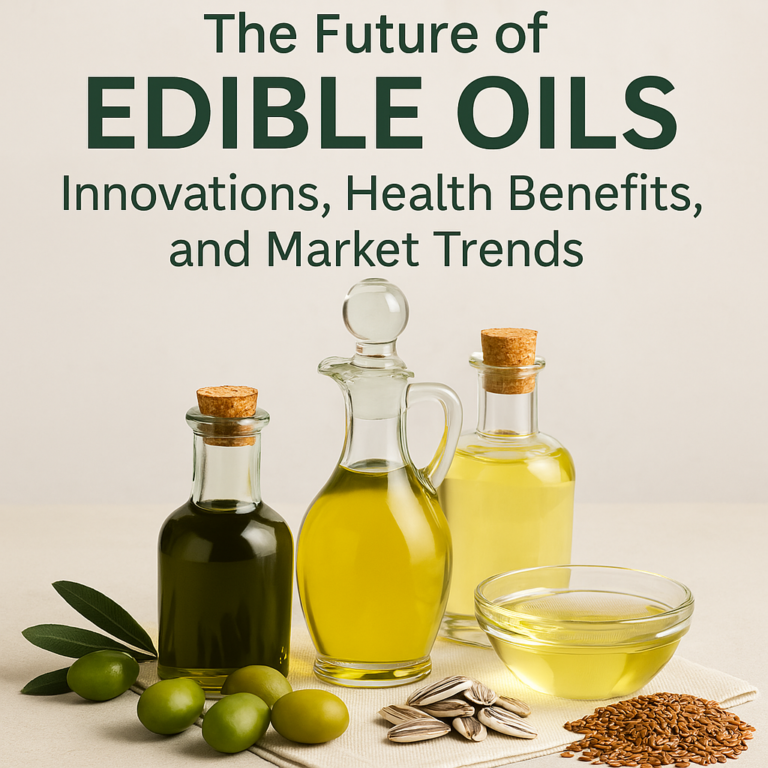
The organic edible oils market is rapidly evolving, driven by rising consumer awareness of health, sustainability, and environmental impact. This shift is reshaping demand and production, as people seek healthier, organic alternatives to conventional oils. In this article, we’ll explore current trends, factors driving growth, and the challenges producers face in meeting this rising demand.
The Growing Demand for Organic Edible Oils
In recent years, consumers have become increasingly health-conscious, leading to greater interest in organic food products, including edible oils. Organic oils are seen as healthier alternatives to traditional, chemically processed options because they are produced without synthetic chemicals, pesticides, or genetically modified organisms (GMOs). Additionally, consumers value the sustainable farming practices involved in organic production, which promote environmental conservation.
Key Drivers of Demand
Health Consciousness: The push for healthier living has driven consumers to scrutinize food labels more closely. Organic oils, which are free from harmful chemicals, offer a healthier option that appeals to those looking to minimize their exposure to toxins.
Environmental Sustainability: Organic farming methods focus on sustainability, reducing environmental impact. This resonates with eco-conscious consumers who want to make environmentally friendly purchasing decisions.
Transparency and Trust: Organic certification provides a level of transparency and trust, giving consumers confidence in the products they buy. This level of certification plays a crucial role in differentiating organic oils from their non-organic counterparts.
Allergen Sensitivity and Dietary Preferences: Many consumers are turning to organic oils for their allergen-friendly properties, particularly for individuals with sensitivities or specific dietary needs. Organic sunflower, coconut, and olive oils are popular choices for those seeking allergen-free cooking oils.
Market Trends in Organic Edible Oil Production
The global market for organic edible oils is projected to experience substantial growth in the coming years. As of now, the demand for organic oils is primarily driven by regions such as North America and Europe, where health-conscious consumers are driving the demand for natural and organic products. However, this trend is expanding globally, with countries in Asia-Pacific and South America also experiencing growth in organic oil consumption.
Popular Organic Edible Oils in the Market
Organic Olive Oil: One of the most popular organic edible oils, olive oil, is favored for its rich flavor and numerous health benefits. Organic olive oil production has seen significant growth, particularly in Mediterranean regions known for their olive farming traditions.
Organic Coconut Oil: Known for its versatility in cooking and cosmetic applications, organic coconut oil has gained popularity due to its health benefits, including antimicrobial properties and heart-healthy fats.
Read More: Coconut Oil vs Olive Oil: Which is Better?
Organic Sunflower Oil: Widely used for frying and cooking, organic sunflower oil is valued for its mild flavor and high smoke point, making it a staple in many kitchens around the world.
Organic Avocado Oil: Avocado oil is prized for its high content of healthy monounsaturated fats and vitamins, making it a sought-after option for consumers looking for premium oils.
Challenges in Organic Edible Oil Production
While demand for organic oils is surging, producers face several challenges in meeting this demand, including higher production costs, limited supply, and stringent regulations. Below are the key challenges that organic oil producers encounter:
Cost of Organic Farming: Producing organic oils is significantly more expensive than conventional oils due to the high cost of organic farming. Organic farming practices require more labor, specific crop rotations, and avoidance of synthetic fertilizers, all of which contribute to higher production costs. These expenses are passed on to the consumer, making organic oils more expensive.
Limited Supply Chain: The supply of organic raw materials for oil production is still limited in many regions. This scarcity leads to price volatility and challenges in consistently meeting consumer demand. Organic oil producers often rely on smaller farms, which may not have the capacity to scale production rapidly.
Certification and Compliance: Achieving organic certification is a rigorous process that requires adherence to strict guidelines. Producers must invest in audits, documentation, and periodic inspections to maintain certification, adding complexity and costs to the production process.
Environmental Factors: Organic farming is highly susceptible to environmental conditions, and organic crop yields tend to be lower than conventional crops. Extreme weather conditions, such as droughts or floods, can disrupt the supply of raw materials for organic oil production, leading to further challenges.
Read More: The Environmental Impact of Edible Oil Production
Sustainability in Organic Oil Production
The emphasis on sustainability is a key driver of the organic oil market. Organic oil producers are committed to sustainable farming practices, which contribute to soil health, biodiversity, and water conservation. By avoiding chemical inputs, organic farming reduces the contamination of water sources and promotes ecosystem balance. Additionally, organic farming practices encourage carbon sequestration, helping to combat climate change.
As consumer demand for sustainable products increases, companies are prioritizing eco-friendly packaging, renewable energy use, and ethical sourcing in their production processes. Many producers are adopting a circular economy approach, where by-products such as oil cakes and residues are repurposed as animal feed or biofuel, minimizing waste and contributing to a greener production cycle.
Future Outlook and Opportunities
The future of the organic edible oil market looks promising, with projected growth driven by increasing consumer awareness of health and environmental concerns. Producers who can innovate and scale their operations efficiently will benefit from this expanding market.
Opportunities exist for small and medium-sized producers to enter the organic oil market by focusing on niche products or region-specific oils that meet local consumer preferences. As the organic sector continues to evolve, partnerships with eco-conscious retailers and the adoption of advanced technologies in farming and extraction will further enhance the production and availability of organic edible oils.
Conclusion
The growing market for organic edible oils reflects a broader trend toward healthier and more sustainable food choices. As consumers become more educated about the benefits of organic oils, the demand will continue to rise. However, meeting this demand requires overcoming challenges such as higher production costs, limited supply, and strict regulations.
Organic oil producers who invest in sustainable practices, certification, and innovation will be well-positioned to capitalize on the expanding market. As the world continues to shift toward more natural and eco-friendly products, organic edible oils will remain at the forefront of this movement, offering both health benefits and environmental advantages.



